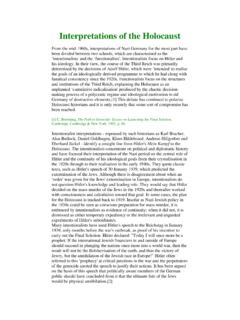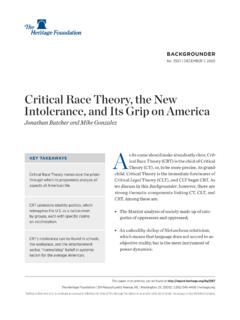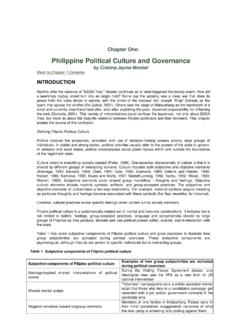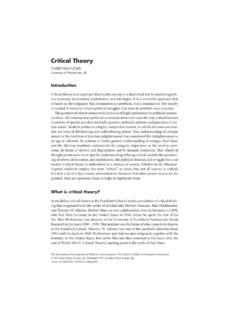Transcription of WHAT IS PHILOSOPHY - IAP
1 WHAT IS PHILOSOPHY ? Studies in Phenomenological and Classical Realism General Editors: Josef Seifert and Giovanni Reale In What is PHILOSOPHY ? the distinguished philosopher Dietrich von Hildebrand analyses the datum of knowledge itself in its different forms, from the most casual perception of some object in our na ve experience to "a priori knowledge," taken as consisting of absolutely certain insights into "necessary essences." Plato's central teaching about that kind of human knowledge which transcends the world of time and of becoming is here purified, clari-fied and deepened. Precise lines are meticulously drawn which distin-guish empirical knowledge, such as is found in the physical sciences, from a priori knowledge, as it can be attained in mathematics, logic and PHILOSOPHY .
2 Most importantly, von Hildebrand draws lines which distinguish fruitful a priori knowledge ("synthetic a priori") from mere tautologies. Von Hildebrand's method is thus sharply opposed to the analytic school of PHILOSOPHY . The book illuminates in a unique way the epistemological thought of earlier philosophers including Plato, Augustine, Descartes and Kant. Fundamentally it expresses the driving principle of "back to the things themselves" which attracted so many outstanding thinkers at the start of the twentieth century and constituted the basis of Phenomenology. In this classic work, von Hildebrand affords the reader the chance to understand phenomenology and to appreciate Husserl's revolutionary early insights, as well as to criticize his later idealism.
3 An extensive introductory essay by Josef Seifert puts the work into a historical and systematic perspective and relates it to present-day An-glo-Saxon thought. 1 WHAT IS PHILOSOPHY ? DIETRICH von HILDEBRAND With an Introductory Essay by Josef Seifert 2 NIHIL OBSTAT: JOHN A. SCHULIEN, Censor librorum IMPRIMATUR: WILLIAM E. COUSINS Archbishop of Milwaukee March 20, 1960 First published 1960 by The Bruce Publishing Company Milwaukee Reprinted 1973 by Franciscan Herald Press, Chicago First published in paperback with introductory essay 1991 by Routledge 11 New Fetter Lane, London EC4P 4EE Simultaneously published in the USA and Canada by Routledge a division of Routledge, Chapman and Hall, Inc.
4 29 West 35th Street, New York, NY 10001 1960 Dietrich von Hildebrand Printed in Great Britain by Clays Ltd, St Ives plc All rights reserved. No part of this book may be reprinted or reproduced or utilized in any form or by any electronic, mechanical, or other means, now known or hereafter invented, including photocopying and recording, or in any information storage or retrieval system, without permission in writing from the publishers. 3 British Library Cataloguing in Publication Data Von Hildebrand, Dietrich, b. 1889-1977 What is PHILOSOPHY ? - (Studies in phenomenological and classical realism). 1. PHILOSOPHY I. Title II. Series 100 Library of Congress Cataloging-in-Publication Data Von Hildebrand, Dietrich, 1889-1977 What is PHILOSOPHY ?
5 / Dietrich von Hildebrand. p. cm. - (Studies in phenomenological and classical realism) Reprint, with new intro. Originally published: Milwaukee: Bruce Pub. Co., 1960. Includes bibliographical references. 1. Knowledge, Theory of. 2. Phenomenology. I. Title. II. Series. BD 161. V 66 1990 100-dc20 90-32233 ISBN 0-415-02584-2 4 CONTENTS EDITOR'S INTRODUCTORY ESSAY .. 7 A short biographical 7 The historical background of the work in the early development of phenomenology .. 12 Dietrich von Hildebrand's contribution to the methodology of phenomenological realism .. 28 The importance of the present book for the critique of transcendental idealism .. 39 Anglo-Saxon empiricism and Hildebrand's more radical "empiricism of essences" as "experiential apriorism".
6 40 Hildebrand's "What is PHILOSOPHY ?" as radical objectivist apriorism .. 50 Conclusion .. 54 56 57 I. KNOWLEDGE IN GENERAL .. 69 1. Knowledge as a primary 69 2. The specific features of taking cognizance of something .. 71 II. BASIC FORMS OF KNOWLEDGE .. 82 III. THE NATURE OF PHILOSOPHICAL KNOWLEDGE IN CONTRAST TO PRESCIENTIFIC KNOWLEDGE .. 93 1. Na ve prescientific 93 2. Theoretical prescientific knowledge .. 104 IV. THE OBJECT OF PHILOSOPHICAL KNOWLEDGE .. 117 1. The characteristics of apriori knowledge .. 117 2. The many meanings of the concepts: apriori and 140 53. Genuine essences are capable of being grasped intuitively .. 150 4. Epistemological characteristics of genuine essences which can be grasped intuitively.
7 183 5. The object of 192 V. OBJECTIVITY AND INDEPENDENCE .. 204 VI. THE TWO BASIC THEMES OF KNOWLEDGE .. 224 VII. DISTINGUISHING MARK OF PHILOSOPHICAL KNOWLEDGE AND INQUIRY .. 237 1. The dominant themes of philosophic inquiry .. 237 2. The depth dimension and depragmatization of the philosophical knowledge of essences .. 243 3. The positive relation of PHILOSOPHY and scientific knowledge .. 262 4. The method of 265 5. 273 VIII. The Meaning of PHILOSOPHY for Man .. 277 6 EDITOR'S INTRODUCTORY ESSAY 1A short biographical note Dietrich von Hildebrand was born in 1889 in Florence, as the sixth child and only son of the German sculptor Adolf von Hildebrand, who created many famous works, such as the Hubertusbrunnen in Munich.
8 Adolf von Hildebrand was also an original thinker and wrote an influ-ential book on aesthetics, The Problem of Form. The personalities of his parents and of his five older sisters, among whom the outstanding painter Lisl (Elisabeth Brewster) deserves a special mention, formed the young Hildebrand (Gogo as his friends called him) as much as the beauty of Italy, of art and of music, which he loved intensely. In spite of the great effect his family had on him, neither their ethi-cal relativism nor their liberal protestantism which accepted Christ only as an extraordinary human being, influenced him. Even as a small boy he argued against his sisters' and father's ethical relativism and from early childhood on he had a strong faith in the divinity of Jesus Christ totally against the beliefs of his family.
9 His father, whose house was a center of art and culture, visited by the greatest European artists and musicians of the day, hired re-nowned scholars to give his son an excellent private education at home. At the age of seventeen, Hildebrand enrolled as a student of 1 This Introductory Essay was written for the present (third) English edition of Hildebrand's What is PHILOSOPHY ? I wish to acknowledge the extensive constructive criticisms and valuable suggestions I have received from my colleague Professor Barry Smith in writing it. 7philosophy at the University of Munich, where he studied with Hans Lipps and Alexander Pf nder, to switch in 1909 to G ttingen, where he pursued his studies under Edmund Husserl, the father of phe-nomenology, and Adolf Reinach, who in 1910 had become Hildebrand's only philosophical teacher and remained his real phi-losophical Max Scheler, too, had a great impact on Hildebrand's philosophic thought.
10 His first major book, Formalism in Ethics and a Non-Formal Ethics of Value (1913), had brought great fame to Scheler and his phi-losophic brilliance as well as the extraordinary charm of his personal-ity made him an influential figure in Germany. As a young student Hildebrand became Scheler's closest personal friend and remained so for many years (1908-21). He organized privately paid courses of lec-tures given by Scheler in G ttingen after the latter had to leave the University of Munich because of a private scandal. In the demagogi-cally conducted show-trial against Scheler, Hildebrand also defended Scheler against personal attacks and calumnies.








